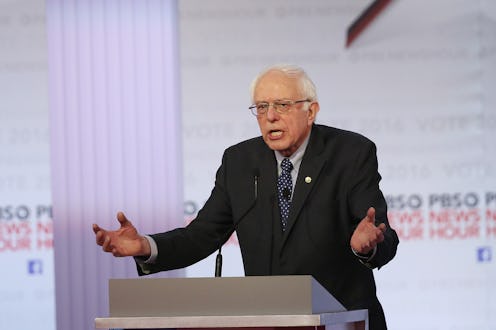News
Bernie Calls Hillary's Attack A "Low Blow"
While the sixth Democratic presidential debate was generally a more muted and restrained face-off than the last one was, it did generate at least one decidedly tense moment: Bernie Sanders said Hillary Clinton delivered a "low blow" on Thursday night, when she called out some of his critical past statements towards President Obama.
The exchange was probably about as heated as things got, and when you compare it to, well, basically everything that happened in the last debate between Sanders and Clinton, that's not saying much. There's no getting around the fact that this was a much more conciliatory, cool-headed encounter on the whole.
But if there's been any familiar, repeated line of attack by Clinton in these debates, it's probably the one she chose to flash near the end of the night. Namely, challenging Sanders for his somewhat robust history of criticism directed at the Obama administration, borne at least in part from the Vermont senator's far-left brand of Democratic socialism ― he's much further to the left than President Obama, which underscores most of the critiques he's made. And while he's running as a Democrat now, Sanders' Senate career was forged as a political independent. In other words, his degree of loyalty to the party and the current administration has been a big, ripe target for Clinton's attacks.
Specifically, Clinton said that Sanders' criticisms of Obama were something she'd "expect from Republicans," but "not expect from someone running for the Democratic nomination to succeed President Obama." That last comparison to the Republicans seemed to be what led Sanders to denounce her remark ― you could hear him groan "ohhhhh" when she said it ― before transitioning into some praise the Obama administration's 8-year run, while up against what he described as "unprecedented" opposition from Senate Republicans.
Not everybody was sympathetic to Sanders' complaint, to be sure. Former Obama campaign manager David Axelrod, for instance, tweeted that the attack was "not a low blow," by virtue of Sanders having supported a primary challenge to Obama in his 2012 reelection bid.
Both of Axelrod's points are entirely true. Sanders did indeed speak approvingly of a primary challenge against Obama in 2011, and he also wrote a blurb for a book of that title, authored by progressive radio host Bill Press. Here's what it said:
Bill Press makes the case why, long after taking the oath of office, the next president of the United States must keep rallying the people who elected him or her on behalf of progressive causes. That is the only way real change will happen. Read this book.
That's certainly lending his approval to a book with a very directly confrontational attitude towards the Obama legacy, no doubt. But it also isn't exactly breathing fire in the president's direction ― Sanders doesn't mention him by name, or cite any particular failing beyond (ostensibly) him not being left-wing enough. It's no shock that Sanders would feel that way, as by almost every measure (except gun control) he's further to the left than Obama, Clinton, or any Democratic presidential contender in recent memory.
And maybe that's why he audibly scoffed at Clinton's criticism on Thursday night ― the part where she compared his disagreements and objections with President Obama to those of the Republicans, who, as you may have noticed over the last several years, hate him with all the searing, tortured agony of a bottomless furnace.
While Axelrod and Clinton are completely right that Sanders is less of a staunch Obama ally than, say, Clinton herself, claiming that his criticisms would be more expected from the GOP is wrong on its face. Sanders' criticisms are entirely because he wants Obama to be more progressive, or at the very least, more beholden to the progressive grassroots thanks to pressures like a primary challenge ― exactly what he's accomplished by running against Clinton, in other words. The Republicans, needless to say, have a very different perspective.
Ultimately, it's up to you to decide whether that constitutes a "low blow," or whether it's a fair statement in the broader context of Sanders' criticisms. But wherever your opinion falls, this will certainly be a hot topic of conversation heading out of Thursday night's debate.
